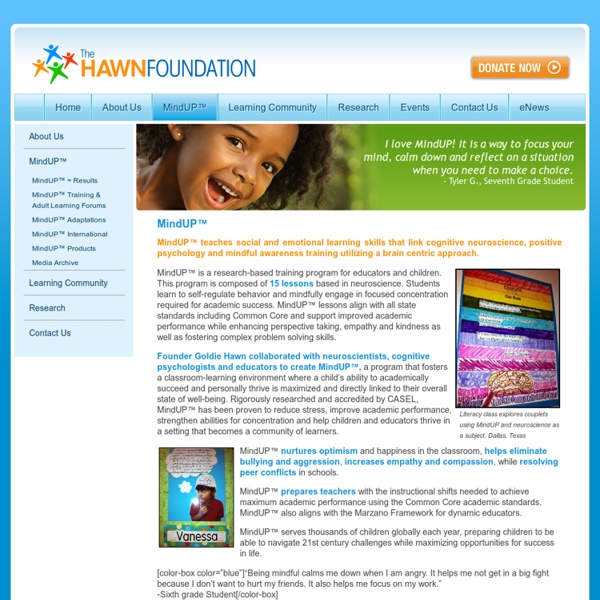The Hawn Foundation

Stuart Shanker
Could Autonomy, Mastery and Purpose Be the Keys to Motivating Students?
Daniel Pink has studied motivation in the business world for a long time and he’s come to the startling conclusion that traditional ways of motivating employees with financial incentives doesn’t work. In study after study, social scientists have found that external rewards narrow the focus and restrict possibilities, making it difficult for people to come up with creative solutions to complex problems. The only time incentives worked, in fact, was when the problem was mechanical and the path to the solution was straightforward. Instead, companies around the world have shown that employee motivation increases when people have autonomy, a driving purpose and the desire to perfect their craft. While his TED talk is framed in the language of business, it’s easy to see the parallels in Pink’s argument to schools and learning. Watch Dan Pink lay out his case.
Zones of Regulation
Jungle Memory- Train Working memory
Canadian Self-Regulation Initiative | CSRI
Cooperative Learning in the classroom: How to do it
Competitive vs. Cooperative Learning Formats Put these kids into groups?! You've got to be kidding. That's the conundrum, isn't it? Cooperative Learning practices help to bridge the gap. Competitive Learning Cooperative Learning No interaction between pupils Active interaction with othersNot accountable to others Accountable to othersResponsible only to self Responsible to the groupHomogeneous grouping, if any Heterogeneous groupingOne student serves as leader Positive interdependencySocial skills assumed or ignored Social skills taught directly Implementing Cooperative Learning Cooperative learning is more than merely having students sit together, helping the others do their work. A true cooperative learning experience requires that a number of criteria be met. The introduction of "learning teams" into the classroom is an effective method for increasing the number of students willing to make an effort to learn in school. Group members are also responsible for the behavior of all members.
Anxiety and Self-Regulation
Stuart Shanker Video
UBC Webcasts: Autism
This series of six webcasts was created for Autism Awareness Month in October 2008. The web casts are based on research conducted in the Autism and Developmental Disabilities Lab at the University of British Columbia, by UBC researchers in collaboration with researchers from other Universities in Canada and was funded by the Ministry of Children and Family Development, the Human Early Learning Partnership and the National Alliance for Autism Research/Autism Speaks. The webcasts were designed to be useful to parents and professionals who work with young children with autism spectrum disorders. For additional information about the research on which these web casts were based, contact Karen Bopp, Ph.D. at bopp@interchange.ubc.ca. These webcasts and interactive or recorded presentations contain general information on the topic. Presentations Support Resources Implications of Research (373 KB PDF)
Autism
Related:
Related:



